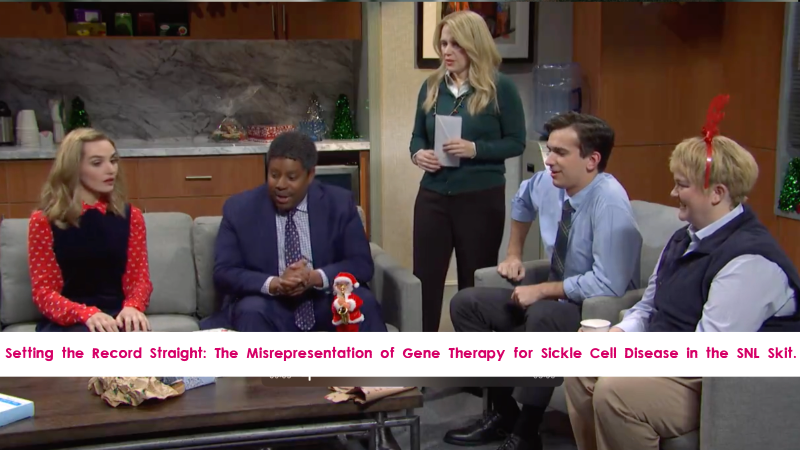On December 8, 2023, an Apple News notification alerted me to the FDA’s groundbreaking approval of two new gene therapy treatments for sickle cell disease. This marked the inaugural FDA approval of gene therapy in the USA, a momentous occasion in my 15-year caregiver journey advocating for sickle cell disease awareness. However, shortly after this historic announcement, Saturday Night Live, known for its comedic takes on current events, aired a skit addressing gene therapy. Despite its intent, the skit appeared to portray crucial aspects inaccurately. Regrettably, SNL’s recent skit on gene therapy for sickle cell disease inadvertently perpetuated misinformation and downplayed the seriousness of the condition. Here, I outline five key discrepancies where the SNL skit missed its mark.
Here we go again! Acknowledging that any form of publicity increases awareness, it’s important to note that trivializing a disease responsible for premature deaths is insensitive to the struggles we face. For over a century, we’ve been awaiting measures to broaden treatment… https://t.co/2KE2AoXxfF
— Elle Cole (She/her) (@Cleverlychangin) December 17, 2023
1. Misinformation on Disease Prevalence:
The skit erroneously suggested that sickle cell disease exclusively affects Black individuals. In reality, while it disproportionately affects people of African descent, it can occur in people from various ethnic backgrounds, including those of Mediterranean, Middle Eastern, and South Asian descent. By perpetuating this misconception, the skit amplified an inaccurate stereotype.
2. Inaccurate Representation of Treatment Accessibility:
The skit depicted a two-year waiting list for FDA-approved gene therapy, portraying a bleak and delayed treatment scenario. However, it failed to acknowledge the ongoing efforts to make gene therapy more accessible and the availability of alternative treatments. Inaccurate timelines can mislead viewers about the current state of medical advancements and accessibility.
3. Insensitive Portrayal of Patient Preferences:
Implying that individuals with sickle cell disease would choose pain over treatment disregards the complex decisions individuals face regarding their health. It overlooks the nuanced considerations, including potential risks, side effects, and personal choices involved in opting for gene therapy or any medical intervention.
4. Trivializing the Multi-Faceted Impact of Sickle Cell Disease:
Sickle cell disease extends beyond pain—it can lead to a spectrum of severe health complications such as avascular necrosis, strokes, organ damage, and sensory impairments like blindness and hearing loss. By solely focusing on pain, the skit undermined the gravity and complexity of the condition.
5. Diminishing the Gravity of the Disease:
By turning sickle cell disease into a punchline, the skit trivialized the struggles and challenges faced by those living with the condition. This portrayal not only disrespects the individuals directly impacted but also perpetuates a culture of insensitivity toward chronic illnesses.
Social Responsibility
While comedy often relies on exaggeration and satire, it’s crucial to handle sensitive topics like health conditions with care and accuracy. The SNL skit missed an opportunity to educate and create awareness about sickle cell disease and the advancements in gene therapy. Addressing complex medical topics in a comedic setting requires a delicate balance between entertainment and responsible representation. Hopefully, future portrayals in popular media will strive for a more accurate and empathetic depiction of medical conditions, promoting understanding and empathy rather than misinformation and trivialization.
Feel free to weigh in on this topic below in the comment section or on Instagram.

